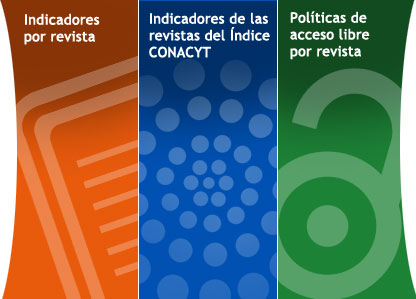UN POCO DE NOSOTROS
Biblat es un portal especializado en revistas científicas y académicas publicadas en América Latina y el Caribe, que ofrece los siguientes servicios:
- Referencias bibliográficas y texto completo de los artículos y documentos publicados en más de 3,000 revistas indizadas en CLASE y PERIÓDICA.
- Visualización gráfica de indicadores extraídos de CLASE, PERIÓDICA, SciELO y de otras bases de datos.
- Información sobre las Políticas de acceso abierto de las revistas indizadas en CLASE , PERIÓDICA.
REVISTAS POR DISCIPLINA
REVISTAS POR PAÍS
INDICADORES BIBLIOMÉTRICOS
Promedio de autores por artículo en la revista
Modelo de ElitismoCantidad de autores más productivos por revista
Índice de densidad de documentosPromedio de artículos por número publicados por año
Índice de concentración temáticaDistribución decreciente de las revistas considerando su grado de concentración temática
Modelo de Bradford (Revista)Distribución de artículos por revista
Modelo de Bradford (Institucional)Distribución de artículos por instituciones
Distribución decreciente de las revistas considerando la proporción de autores extranjeros
Tasa anual de autoría exógena dividida por país NuevoProporción anual total de autores extranjeros dividida por país
Documentos de una revista por institución NuevoProporción de la participación de instituciones en los documentos de la revista
Documentos anuales de una revista por institución NuevoParticipación institucional anual en los documentos publicados por la revista
Coautoría entre países NuevoColaboración entre autores según el país de afiliación institucional en una revista
FRECUENCIAS (CLASE y PERIÓDICA)
Por autor
Por institución de afiliación del autor
- Número de documentos publicados por institución
- Número de documentos publicados por institución según el país de la revista
- Número de documentos publicados por institución según la revista de publicación
- Número de documentos publicados por autor según su institución de afiliación
- Número de documentos publicados por disciplina según la institución
Por país de institución de afiliación del autor
Por disciplina
- Número de documentos publicados por disciplina
- Número de documentos publicados por disciplina y revista
- Número de documentos publicados por disciplina e institución de afiliación del autor
- Número de documentos publicados por disciplina y país de la revista
- Número de documentos publicados por disciplina y país de la institución de afiliación del autor
Por revista
FRECUENCIAS POR INSTITUCIÓN
INDICADORES SCIELO
OTROS INDICADORES








